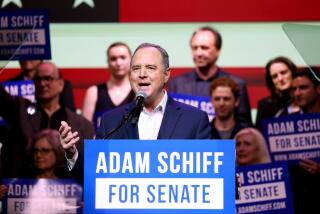Audit Faults Feinstein’s 1990 Campaign : Politics: She did not report $500,000 in contributions during governor’s race. Attorney says inquiry constitutes conflict of interest by Controller Gray Davis, her rival for a Senate seat.
- Share via
SACRAMENTO — In an audit critical of Dianne Feinstein’s 1990 gubernatorial campaign finances, state examiners have found that the former San Francisco mayor violated California law by failing to disclose more than $500,000 in contributions.
Auditors, who sifted through the financial paperwork of a $19-million campaign effort that began in 1989 and ended in November, 1990, said the campaign also failed to disclose the true source of a $2.4-million loan, to itemize $3.6 million in expenditures and to notify 166 major campaign contributors that they had to file their own disclosures.
The auditors said the loan was reported as coming from Feinstein when the real source was the Bank of America. Feinstein and her husband, Richard Blum, had borrowed the money from the bank and transferred the funds to her campaign.
The audit also criticized Feinstein for failing to disclose that her husband was co-signer on that loan and two others.
The 11-page audit of political fund raising and spending in Feinstein’s losing campaign for governor became public Tuesday when it was formally delivered to the Fair Political Practices Commission, the state’s ethical watchdog agency, by auditors from the Franchise Tax Board.
“The filer (Feinstein) has, in our opinion, not substantially complied with the disclosure and/or record-keeping provisions of the Political Reform Act,” the auditors concluded.
Feinstein is running for the U.S. Senate seat vacated by Gov. Pete Wilson after he defeated her in 1990.
Although the three-member governing board of the Franchise Tax Board includes Controller Gray Davis, who is Feinstein’s Democratic primary opponent in the Senate race, a spokesman for the agency insisted that Davis had no connection with the audit. He said board members were privately advised of the findings weeks ago, but all other decisions relating to the audit were made by the agency’s professional staff.
The tax agency is required by law to audit the campaign finance reports of candidates for state constitutional offices.
However, Feinstein’s attorney, Ronald Turovsky of Los Angeles, complained in a March 26 letter that Davis’ membership on the board made it a conflict of interest for the tax board to conduct any audit of Feinstein. He said the board should have asked an another agency to complete the audit.
FPPC officials said the audit will be reviewed by their agency to determine if any action should be taken against the campaign. The commission is empowered by state law to levy fines of up to $2,000 for each individual breach of reporting requirements.
Feinstein could not be reached for comment but a spokesman acknowledged that the 1989 and 1990 financial reports had been riddled with “careless, stupid, clerical mistakes.”
“These were bookkeeping errors . . . and the campaign is doing everything it can to correct them,” said Kam Kuwata, a spokesman for Feinstein’s senatorial campaign.
Kuwata said that Feinstein had never intended to hide anything but that volunteers who kept the accounts for the campaign had been sloppy in their bookkeeping and failed to keep track of some late donations and small cash contributions.
In some cases, he said, they simply were unaware of the fine points of the state’s campaign reporting laws.
“Mistakes were made clearly and these bookkeepers did a terrible job,” said Kuwata. “If you put a letter grade on (Feinstein’s desire to) disclose you would give the campaign an A--on bookkeeping you’d probably give it an F.”
Even so, the audit report is expected to provide political fodder for Feinstein’s opponents. Indeed, shortly after the audit became public, a spokesman for Davis was comparing it to the U.S. House of Representatives’ bank scandal.
“Feinstein’s sloppy handling of her campaign finances makes the House bank look like a Big 8 accounting firm,” said Scott Shafer, a spokesman for Davis’ campaign. “If she can’t handle her own campaign finances, how in the world is she going to make smart decisions about a $1-trillion federal budget?”
Asked if Davis intended to make the audit a campaign issue, Shafer said “it may become an issue if it calls into question her ability to handle public finances.”
But Kuwata said he did not consider Feinstein’s breach of reporting laws nearly as serious as accusations that Davis used state workers to raise money in a 1986 campaign.
John K. Van de Kamp, then the state attorney general, found that state workers had worked on Davis’ campaign on state time. But the attorney general concluded that he could make no case against Davis. During the investigation, the controller voluntarily paid the state for the workers’ time.
Kuwata said Feinstein’s case did not involve any expenditure of public money. He said that in most instances the contributions that were not reported involved cash donations collected at “grass-roots house parties.”
He said the campaign had assumed it was complying with state law when it reported a $2-million loan as coming from Feinstein when it originated with the Bank of America. He said Feinstein and her husband had been led to believe by the FPPC that they did not have to disclose its original source.
More to Read
Get the L.A. Times Politics newsletter
Deeply reported insights into legislation, politics and policy from Sacramento, Washington and beyond. In your inbox twice per week.
You may occasionally receive promotional content from the Los Angeles Times.










